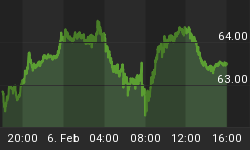It hasn't happened yet, but it is about to.
Not since just before the financial crisis has the expected 10-year real return from stocks been below the 10-year TIPS yield. But with TIPS selling off and stocks rallying, the numbers are virtually the same: both stocks, and TIPS, have an expected real return of about 0.70% per annum for the next 10 years.
A quick word about my method is appropriate because some analysts will consider this spread to already be negative. I use a method similar to that used by Arnott, Grantham, and other well-known 'value' investors: I add the dividend yield for equities to an estimate of long-run real economic growth, and then assume that cyclical multiples pull two-thirds of the way back to the long-run value, over ten years. (By comparison, Grantham assumes that multiples fully mean-revert, over seven years, so he will see stocks as even more expensive than I do - but the important point is that the method doesn't change over time).
Somewhat trickier is the calculation of 10-year real yields before 1997, when TIPS were first issued. But we have a way to do that as well - a method much better than the old-fashioned approach of taking current ten-year yields and subtracting trailing 1-year inflation (used by many notables, including such names as Fama). That only matters because the chart I am about to show goes back to 1956, and so I know someone would ask where I got 10 year real yields prior to 1997.
The chart below (Source: Enduring Investments) shows the "real equity premium" - the expected real return of stocks, compared to the true risk-free asset at a 10-year horizon: 10-year TIPS.

The good news is that in this sense, stocks are not as expensive relatively as they were in the late 1990s, nor as expensive (although much closer) relatively as they were prior to the global financial crisis. Nor even as they were (although even closer) just prior to the 1987 stock market crash. Yay.
The bad news is that they are every bit as expensive as they were in early 1973, just before the ten-year bear market that was, in real terms, every bit as bad as the 2000-2009 bear market. From 1973 to mid-1982, stocks lost roughly 60% of their value in real terms - just about what they lost in real terms between 2000 and 2009. The chart below (Source: Bloomberg) shows the S&P 500 divided by CPI, on a log scale so you can see the similar percentage moves.

The parallels with 1999 don't scare me. There isn't the same exuberance over companies with no earnings[1] and "new world" "new paradigm" chatterings. But the parallels with the late 1960s/early 1970s frighten me quite a bit more. The hippies are out protesting, and everything! The interest rate cycle in 1973 had already long-since bottomed, as had core inflation - although in 1972 and 1973 inflation had actually come back down from the Vietnam War-induced bump of the late 1960s. In 2016, we also face an interest rate cycle that has turned, and core inflation that bottomed more than six years ago. In 1973, a Republican President had just been (re-)elected and stocks rallied into the inauguration. And that, my friends, was that. Poor central bank policy - encouraged by a certain Chairman of the Council of Economic Advisers named Alan Greenspan - ensured that even when stocks bottomed in nominal terms in 1974, they continued to lose value to accelerating inflationary dynamics.
I could go on, but these are merely my own qualms. The quantitative fact, and not the story, is what matters: stocks now no longer offer an expectation of return in excess of the risk-free return. They may keep rallying for years since the US dollar is the high-yielding currency and money needs to go somewhere, but we are into the realm of speculative finance. For a while, the argument for stocks was "sure, they're expensive, but with yields this low they are still relatively better." They're no longer even relatively better.
[1] With the exception of Tesla.
P.S. Don't forget to buy my book! What's Wrong with Money: The Biggest Bubble of All. Thanks!
You can follow me @inflation_guy!
Enduring Investments is a registered investment adviser that specializes in solving inflation-related problems. Fill out the contact form at http://www.EnduringInvestments.com/contact and we will send you our latest Quarterly Inflation Outlook. And if you make sure to put your physical mailing address in the "comment" section of the contact form, we will also send you a copy of Michael Ashton's book "Maestro, My Ass!"















